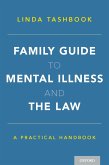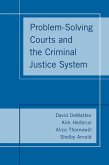The Oxford Handbook of Psychology and Law (eBook, PDF)


Alle Infos zum eBook verschenken

The Oxford Handbook of Psychology and Law (eBook, PDF)
- Format: PDF
- Merkliste
- Auf die Merkliste
- Bewerten Bewerten
- Teilen
- Produkt teilen
- Produkterinnerung
- Produkterinnerung

Hier können Sie sich einloggen

Bitte loggen Sie sich zunächst in Ihr Kundenkonto ein oder registrieren Sie sich bei bücher.de, um das eBook-Abo tolino select nutzen zu können.
The field of psychology-law is extremely broad, encompassing a strikingly large range of topic areas in both applied psychology and experimental psychology. Importantly, both applied and experimental psychologists have made meaningful contributions to the psychology-law field, and each of these domains includes a range of well-developed topic areas with robust empirical support. Despite the continued and rapid growth of the field, there is no current and comprehensive resource that provides coverage of the major topic areas in the psychology-law field. The Oxford Handbook of Psychology and Law…mehr
- Geräte: PC
- mit Kopierschutz
- eBook Hilfe
- Größe: 43.72MB
![The Legacy of Racism for Children (eBook, PDF) The Legacy of Racism for Children (eBook, PDF)]() The Legacy of Racism for Children (eBook, PDF)44,95 €
The Legacy of Racism for Children (eBook, PDF)44,95 €![Finding the Truth in the Courtroom (eBook, PDF) Finding the Truth in the Courtroom (eBook, PDF)]() Finding the Truth in the Courtroom (eBook, PDF)41,95 €
Finding the Truth in the Courtroom (eBook, PDF)41,95 €![Family Guide to Mental Illness and the Law (eBook, PDF) Family Guide to Mental Illness and the Law (eBook, PDF)]() Linda TashbookFamily Guide to Mental Illness and the Law (eBook, PDF)23,95 €
Linda TashbookFamily Guide to Mental Illness and the Law (eBook, PDF)23,95 €![Familiarity and Conviction in the Criminal Justice System (eBook, PDF) Familiarity and Conviction in the Criminal Justice System (eBook, PDF)]() Joanna PozzuloFamiliarity and Conviction in the Criminal Justice System (eBook, PDF)24,95 €
Joanna PozzuloFamiliarity and Conviction in the Criminal Justice System (eBook, PDF)24,95 €![Problem-Solving Courts and the Criminal Justice System (eBook, PDF) Problem-Solving Courts and the Criminal Justice System (eBook, PDF)]() David DematteoProblem-Solving Courts and the Criminal Justice System (eBook, PDF)57,95 €
David DematteoProblem-Solving Courts and the Criminal Justice System (eBook, PDF)57,95 €![The Routledge International Handbook of Legal and Investigative Psychology (eBook, PDF) The Routledge International Handbook of Legal and Investigative Psychology (eBook, PDF)]() The Routledge International Handbook of Legal and Investigative Psychology (eBook, PDF)44,95 €
The Routledge International Handbook of Legal and Investigative Psychology (eBook, PDF)44,95 €![Wrongful Conviction in Sexual Assault (eBook, PDF) Wrongful Conviction in Sexual Assault (eBook, PDF)]() Matthew Barry JohnsonWrongful Conviction in Sexual Assault (eBook, PDF)38,95 €
Matthew Barry JohnsonWrongful Conviction in Sexual Assault (eBook, PDF)38,95 €-
-
-
Dieser Download kann aus rechtlichen Gründen nur mit Rechnungsadresse in A, B, BG, CY, CZ, D, DK, EW, E, FIN, F, GR, HR, H, IRL, I, LT, L, LR, M, NL, PL, P, R, S, SLO, SK ausgeliefert werden.
- Produktdetails
- Verlag: OUP eBook
- Erscheinungstermin: 28. Februar 2023
- Englisch
- ISBN-13: 9780197649145
- Artikelnr.: 67441061
- Verlag: OUP eBook
- Erscheinungstermin: 28. Februar 2023
- Englisch
- ISBN-13: 9780197649145
- Artikelnr.: 67441061
- Herstellerkennzeichnung Die Herstellerinformationen sind derzeit nicht verfügbar.
* Foundational Psychology-Law
* Chapter 1: Training for Careers in Psychology-Law - David DeMatteo
and Kyle C. Scherr
* Chapter 2: Influencing Policy and Procedure with Law-Psychology
Research: Why, When, Where, How, and What - Brian H. Bornstein and
Christian A. Meissner
* Chapter 3: Preventive Justice - Christopher Slobogin
* Chapter 4: Expert Psychological Testimony - Brian L. Cutler and
Daniel A. Krauss
* Chapter 5: Psychology and Law, Meet Open Science - Bradley D.
McAuliff, Melanie B. Fessinger, Anthony D. Perillo, and Jennifer T.
Perillo
* Applied Psychology-Law
* Part I: General Considerations
* Chapter 6: A Framework for Forensic Mental Health Assessments:
Principles, Standards of Care, and Standards of Practice - Kirk
Heilbrun, Madelena Rizzo, Kellie Wiltsie, and Heidi Zapotocky
* Chapter 7: Ethics in Forensic Psychology Practice - Randy K. Otto
* Chapter 8: Forensic Report Writing: Proposing a Research Agenda -
Richart L. DeMier and Daniel A. Krauss
* Part II: Criminal and Civil Forensic Psychology
* Chapter 9: Emerging Issues in Competence to Stand Trial Evaluation -
Patricia A. Zapf and Amanda Beltrani
* Chapter 10: Criminal Responsibility Evaluations - Ira K. Packer and
Lauren E. Kois
* Chapter 11: Of Capital Importance: Considerations in Capital
Sentencing Contexts - Jaymes Fairfax-Columbo, Bronwyn Neeser,
Alexandra Kudatzky, and David DeMatteo
* Chapter 12: Forensic Evaluation in Civil Litigation: A Case Example -
Julie M. Brovko and William E. Foote
* Chapter 13: Evaluating Workplace Disability - Lisa Drago Piechowski
* Chapter 14: Child Custody Evaluations - Jonathan W. Gould and
Christopher Mulchay
* Chapter 15: Forensic Mental Health Assessment in Immigration Court -
Virginia Barber-Rioja and Alexandria Garcia-Mansilla
* Chapter 16: Forensic Mental Health Assessments in Juvenile Justice
Contexts - Christopher M. King, Lauren Grove, Sarah Hitchcock, Kenny
Gonzalez, Amanda Palardy, and Nicole Guevara
* Chapter 17: Neuropsychological Considerations in Forensic Mental
Health Assessment - Casey LaDuke, Chriscelyn M. Tussey, Bernice A.
Marcopulos, Scott D. Bender, and Beth C. Arredondo
* Chapter 18: Violence Risk Assessment and Management - Stephen D. Hart
and Kevin S. Douglas
* Chapter 19: Response Styles Within the Forensic Context: Conceptual
Issues and Assessment Methods - Richard Rogers and Minqi Pan
* Chapter 20: How Reliable and Objective are Forensic Mental Health
Evaluators? - Daniel C. Murrie and Marcus T. Boccaccini
* Part III: Consultation and Intervention
* Chapter 21: Trial Consultation - Eric Y. Drogin and Leigh D. Hagan
* Chapter 22: Managerial Justice, Community Supervision, and Treatment
Mandates: The Intersection of Clinical Practice and Social Control -
Benjamin J. Mackey, JoAnn Lee, CJ Appleton, Sarah Skidmore, and Faye
S. Taxman
* Chapter 23: Treating Justice-Involved Populations with Severe Mental
Illness - Robert D. Morgan, Faith Scanlon, Jessica Mattera, and
McCown Leggett
* Chapter 24: Key Considerations for Pre-arrest Diversion Programs -
David S. Festinger, Jessica L. Lipkin, Daniel J. Flack, David
DeMatteo, and Karen L. Dugosh
* Chapter 25: Rehabilitative Justice: Problem-Solving Courts - Shelby
Arnold, Alice Thornewill, Kirk Heilbrun, and David DeMatteo
* Experimental Psychology-Law
* Part I: Witnesses and Victims
* Chapter 26: The Emerging Investigative Practice of Tele-Forensic
Interviewing: Implications for Children's Testimony - Jason J.
Dickinson, Nicole E. Lytle, and Debra Ann Poole
* Chapter 27: Using Reflector Variables to Determine Whether the
Culprit is Present in or Absent from a Police Lineup - Andrew M.
Smith and Gary L. Wells
* Chapter 28: Interviewing Cooperative Forensic Witnesses and
Mediation: Areas of Overlap and Potential for Future Research -
Deborah Goldfarb and Ronald P. Fisher
* Chapter 29: Emerging Policy Issues Related to Sexual Violence in
Higher Education:
* Investigation and Adjudication Procedures and Mandatory Reporting
Policies - Allison E. Cipriano and Kathryn J. Holland
* Chapter 30: Legal Decision Making Among Youth Defendants, Victims,
and Witnesses: Emerging Issues, Research, and Theory - Lindsay C.
Malloy, Joshua Wyman, Shreya Mukhopadhyay, and Jodi A. Quas
* Chapter 31: Why Seeing the Big Picture in the Study of Public Safety
is Necessary for Combatting Racism Within It - Gwen Prowse and
Phillip Atiba Goff
* Part II: Evidence Gathering and Pursuit in Criminal Cases
* Chapter 32: Procedural Justice Theory: Challenges and New Extensions
- Ben Bradford, Arabella Kyprianides, and Julia A. Yesberg
* Chapter 33: The Present and Future of Verbal Lie Detection - Aldert
Vrij, Pär Anders Granhag, Sharon Leal, Ronald P. Fisher, Steven M.
Kleinman, and Tzachi Ashkenazi
* Chapter 34: Investigative Interviewing: A Review of the Literature
and a Model of Science-Based Practice - Christian A. Meissner, Steven
M. Kleinman, Amelia Mindthoff, Erik P. Phillips, and Jesse N.
Rothweiler
* Chapter 35: Police Custody: A Legal Construct in Search of a
Definition - Fabiana Alceste and Saul M. Kassin
* Chapter 36: Human Factors in Forensic Science: Psychological Causes
of Bias and Error - Jeff Kukucka and Itiel E. Dror
* Chapter 37: Psychological Barriers to the Detection of Child Sexual
Abuse - Nicholas Scurich and Park Dietz
* Chapter 38: First Steps on the Path to Wrongful Conviction:
Phenomenology of Innocence, Police Stops, and Expectancies - Max
Guyll, Kyle C. Scherr, Stephanie Madon, and Jessica Munoz
* Part III: Criminal Outcomes
* Chapter 39: Emerging Issues in the Psycho-Legal Study of Guilty Pleas
- Allison Redlich, Tina Zottoli, Amy Dezember, Ryan Schneider, Mary
Catlin, and Suraiya Shammi
* Chapter 40: Prosecutorial Misconduct - Margaret Bull Kovera and
Melanie B. Fessinger
* Chapter 41: Jury Decision Making - Lora M. Levett
* Chapter 42: Emotion and Legal Judgment - Liana C. Peter-Hagene,
Samantha Bean, and Jessica M. Salerno
* Chapter 43: Injustice in the Courtroom: How Race and Ethnicity Affect
Legal Outcomes - Jennifer S. Hunt
* Chapter 44: Law, Psychology, and Wrongful Convictions - Brandon L.
Garrett and William Crozier
* Foundational Psychology-Law
* Chapter 1: Training for Careers in Psychology-Law - David DeMatteo
and Kyle C. Scherr
* Chapter 2: Influencing Policy and Procedure with Law-Psychology
Research: Why, When, Where, How, and What - Brian H. Bornstein and
Christian A. Meissner
* Chapter 3: Preventive Justice - Christopher Slobogin
* Chapter 4: Expert Psychological Testimony - Brian L. Cutler and
Daniel A. Krauss
* Chapter 5: Psychology and Law, Meet Open Science - Bradley D.
McAuliff, Melanie B. Fessinger, Anthony D. Perillo, and Jennifer T.
Perillo
* Applied Psychology-Law
* Part I: General Considerations
* Chapter 6: A Framework for Forensic Mental Health Assessments:
Principles, Standards of Care, and Standards of Practice - Kirk
Heilbrun, Madelena Rizzo, Kellie Wiltsie, and Heidi Zapotocky
* Chapter 7: Ethics in Forensic Psychology Practice - Randy K. Otto
* Chapter 8: Forensic Report Writing: Proposing a Research Agenda -
Richart L. DeMier and Daniel A. Krauss
* Part II: Criminal and Civil Forensic Psychology
* Chapter 9: Emerging Issues in Competence to Stand Trial Evaluation -
Patricia A. Zapf and Amanda Beltrani
* Chapter 10: Criminal Responsibility Evaluations - Ira K. Packer and
Lauren E. Kois
* Chapter 11: Of Capital Importance: Considerations in Capital
Sentencing Contexts - Jaymes Fairfax-Columbo, Bronwyn Neeser,
Alexandra Kudatzky, and David DeMatteo
* Chapter 12: Forensic Evaluation in Civil Litigation: A Case Example -
Julie M. Brovko and William E. Foote
* Chapter 13: Evaluating Workplace Disability - Lisa Drago Piechowski
* Chapter 14: Child Custody Evaluations - Jonathan W. Gould and
Christopher Mulchay
* Chapter 15: Forensic Mental Health Assessment in Immigration Court -
Virginia Barber-Rioja and Alexandria Garcia-Mansilla
* Chapter 16: Forensic Mental Health Assessments in Juvenile Justice
Contexts - Christopher M. King, Lauren Grove, Sarah Hitchcock, Kenny
Gonzalez, Amanda Palardy, and Nicole Guevara
* Chapter 17: Neuropsychological Considerations in Forensic Mental
Health Assessment - Casey LaDuke, Chriscelyn M. Tussey, Bernice A.
Marcopulos, Scott D. Bender, and Beth C. Arredondo
* Chapter 18: Violence Risk Assessment and Management - Stephen D. Hart
and Kevin S. Douglas
* Chapter 19: Response Styles Within the Forensic Context: Conceptual
Issues and Assessment Methods - Richard Rogers and Minqi Pan
* Chapter 20: How Reliable and Objective are Forensic Mental Health
Evaluators? - Daniel C. Murrie and Marcus T. Boccaccini
* Part III: Consultation and Intervention
* Chapter 21: Trial Consultation - Eric Y. Drogin and Leigh D. Hagan
* Chapter 22: Managerial Justice, Community Supervision, and Treatment
Mandates: The Intersection of Clinical Practice and Social Control -
Benjamin J. Mackey, JoAnn Lee, CJ Appleton, Sarah Skidmore, and Faye
S. Taxman
* Chapter 23: Treating Justice-Involved Populations with Severe Mental
Illness - Robert D. Morgan, Faith Scanlon, Jessica Mattera, and
McCown Leggett
* Chapter 24: Key Considerations for Pre-arrest Diversion Programs -
David S. Festinger, Jessica L. Lipkin, Daniel J. Flack, David
DeMatteo, and Karen L. Dugosh
* Chapter 25: Rehabilitative Justice: Problem-Solving Courts - Shelby
Arnold, Alice Thornewill, Kirk Heilbrun, and David DeMatteo
* Experimental Psychology-Law
* Part I: Witnesses and Victims
* Chapter 26: The Emerging Investigative Practice of Tele-Forensic
Interviewing: Implications for Children's Testimony - Jason J.
Dickinson, Nicole E. Lytle, and Debra Ann Poole
* Chapter 27: Using Reflector Variables to Determine Whether the
Culprit is Present in or Absent from a Police Lineup - Andrew M.
Smith and Gary L. Wells
* Chapter 28: Interviewing Cooperative Forensic Witnesses and
Mediation: Areas of Overlap and Potential for Future Research -
Deborah Goldfarb and Ronald P. Fisher
* Chapter 29: Emerging Policy Issues Related to Sexual Violence in
Higher Education:
* Investigation and Adjudication Procedures and Mandatory Reporting
Policies - Allison E. Cipriano and Kathryn J. Holland
* Chapter 30: Legal Decision Making Among Youth Defendants, Victims,
and Witnesses: Emerging Issues, Research, and Theory - Lindsay C.
Malloy, Joshua Wyman, Shreya Mukhopadhyay, and Jodi A. Quas
* Chapter 31: Why Seeing the Big Picture in the Study of Public Safety
is Necessary for Combatting Racism Within It - Gwen Prowse and
Phillip Atiba Goff
* Part II: Evidence Gathering and Pursuit in Criminal Cases
* Chapter 32: Procedural Justice Theory: Challenges and New Extensions
- Ben Bradford, Arabella Kyprianides, and Julia A. Yesberg
* Chapter 33: The Present and Future of Verbal Lie Detection - Aldert
Vrij, Pär Anders Granhag, Sharon Leal, Ronald P. Fisher, Steven M.
Kleinman, and Tzachi Ashkenazi
* Chapter 34: Investigative Interviewing: A Review of the Literature
and a Model of Science-Based Practice - Christian A. Meissner, Steven
M. Kleinman, Amelia Mindthoff, Erik P. Phillips, and Jesse N.
Rothweiler
* Chapter 35: Police Custody: A Legal Construct in Search of a
Definition - Fabiana Alceste and Saul M. Kassin
* Chapter 36: Human Factors in Forensic Science: Psychological Causes
of Bias and Error - Jeff Kukucka and Itiel E. Dror
* Chapter 37: Psychological Barriers to the Detection of Child Sexual
Abuse - Nicholas Scurich and Park Dietz
* Chapter 38: First Steps on the Path to Wrongful Conviction:
Phenomenology of Innocence, Police Stops, and Expectancies - Max
Guyll, Kyle C. Scherr, Stephanie Madon, and Jessica Munoz
* Part III: Criminal Outcomes
* Chapter 39: Emerging Issues in the Psycho-Legal Study of Guilty Pleas
- Allison Redlich, Tina Zottoli, Amy Dezember, Ryan Schneider, Mary
Catlin, and Suraiya Shammi
* Chapter 40: Prosecutorial Misconduct - Margaret Bull Kovera and
Melanie B. Fessinger
* Chapter 41: Jury Decision Making - Lora M. Levett
* Chapter 42: Emotion and Legal Judgment - Liana C. Peter-Hagene,
Samantha Bean, and Jessica M. Salerno
* Chapter 43: Injustice in the Courtroom: How Race and Ethnicity Affect
Legal Outcomes - Jennifer S. Hunt
* Chapter 44: Law, Psychology, and Wrongful Convictions - Brandon L.
Garrett and William Crozier







